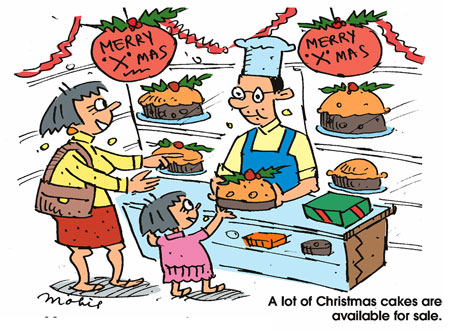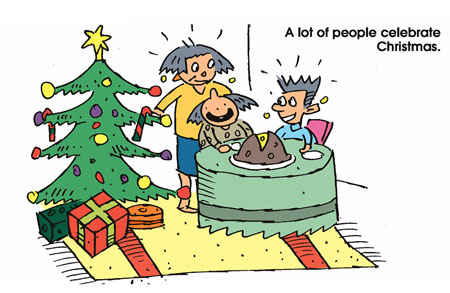|

by R. S. Karunaratne
Subject - verb agreement
A lot of
When we use 'a lot of' before an uncountable noun, it is followed by a
singular verb.
A lot of money has been siphoned off from the company.
A lot of crude oil has seeped into the sea.
A lot of singing was heard at his wedding.
A lot of coconut oil was used to fry the fish.
A lot of orange juice was made to quench the thirst of visitors.

When we use ' a lot of' before a plural noun or pronoun, it is
followed by a plural verb.
A lot of Christmas cakes are available for sale.
A lot of people celebrate Christmas.
A lot of students fail in English at the G.C.E. O/L Examination.
A lot of astrologers predict that the world will not come to an end this
year.
A lot of beggars do not wish to give up their job.
A lot of independent candidates lose their deposits at elections.
A lot of us want to do well in life.
Any / every / any of
We use 'any' and 'every' before a singular noun.
Is there any student interested in music?
Any increase in our salary is out of the question.
Any fool can ask such questions.
Any writer gets copyright of his writings automatically.
Any child is capable of doing this sum.
Every item I bought was substandard.
Every private tutor earns a lot of money.
Every boy was given a bat and ball.
Every book she reads is interesting.
Every minute is precious.
Every house is decorated with a Christmas tree.
We use 'any of' before a plural noun or pronoun with a singular verb.
Any of them is eligible to apply for the post of translator.
Any of these fabrics is suitable for her dress.
Any of my students is suitable for this job.
Any of these vitamin tablets is suitable for children.
Any of us is likely to be selected.
Indefinite pronouns
Indefinite pronouns refer to people or things without pointing out
exactly who or what they are. Indefinite pronouns include the following:
anyone, anybody, everybody, everything, nobody, someone, something
All indefinite pronouns are followed by singular verbs.
Anyone is eligible to take part in the competition.
Anybody who doesn't vote will be punished.
Everybody has access to libraries.
Everything is ready for the meeting.
Nobody wants to get hurt.
Someone has made a rude remark about you.
Something is missing from the cupboard.

When we use 'none of' with an uncountable noun, we use a singular
verb.
None of the furniture matches the curtains.
None of the fish we bought was fresh.
Note: When we place 'none of' before a plural noun, we can use either a
singular or a plural verb.
None of the visitors was / were impressed by the menu.
None of the women approve / approves of the new fashions displayed.
None of the ladies has / have come from Canada.
None of the sarees at the shop is / are worth the prices marked.
[Activity]
Underline the correct word or words and check your answers with the
key.
1. Something appear / appears to be wrong with my computer.
2. Any of us is / are likely to win the lottery.
3. Every candidate has / have to read the instructions carefully.
4. Anything toxic affects / affect the health of children.
5. A lot of music was / were heard from his room.
6. Somebody here do / does not like me.
7. None of the hot-dogs you bought are / is fresh.
8. Everyone here pray / prays to weather gods.
9. A lot of lies has / have been uttered by politicians.
10. Any of your students is / are sure to win a scholarship.
Key: 1. appears 2. is 3. has 4. affects 5. was 6. does 7. are
or is 8. prays 9. have 10. is
Popular proverbs
The definition of a proverb given in The Advanced Learner's
Dictionary of Current English is as good as any: "A popular short
saying, with words of advice or warning."
Here is a selection of popular proverbs for your knowledge bank.
1. Good company on the road is the shortest cut
If you go on a journey alone, you will feel that it is tiresome.
However, if you have a pleasant companion, you will not feel any
weariness.
2. A good husband makes a good wife
If a husband treats his wife well, she will also treat him in the same
way. Similarly, if you treat others well, they will reciprocate your
feelings.
3. A good name is sooner lost than won
We take a long time to build up a good reputation. However, just one act
of bad behaviour will mar that reputation.
4. A good tale is none the worse for being told twice
People, especially children, love to hear a good story more than once.
It will not lose its novelty.
5. Good wine needs no bush
High-quality goods or services need no publicity or advertising. People
soon get to know about them.
6. The grapes are sour People who cannot get what they want pretend
that they never wanted it. This comes from the fable of the fox and the
bunch of grapes it couldn't reach.
7. Grasp all, lose all
Greedy people try to grasp everything. In the process they might lose
even what they already possess.
8. A great city, a great solitude
A great city is a symbol of civilization. In such a city people go about
their own affairs without showing any interest in other people.
9. Great oaks from little acorns grow
Everything has a small beginning. So, we should not be discouraged by
our own "smallness."
10. The greatest talkers are the least doers
Great talkers are poor performers. If you look around, you can find many
examples. |



